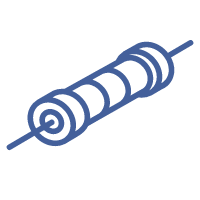
CAL-CHIP RM04F6040CT
RM04F6040CT
4-SMD, No Lead
37433075-RM04F6040CT
Res SMD 604 Ohm 1% 1/16W 0402
- Mounting TypeSurface Mount
- Package / Case4-SMD, No Lead
- Supplier Device Package0402
- PackageBulk
- MfrSuntsu Electronics, Inc.
- Product StatusActive
- Operating Temperature
The operating temperature is the range of ambient temperature within which a power supply, or any other electrical equipment, operate in. This ranges from a minimum operating temperature, to a peak or maximum operating temperature, outside which, the power supply may fail.
-40°C ~ 85°C - SeriesSXT214
- Size / Dimension0.079 L x 0.063 W (2.00mm x 1.60mm)
- Tolerance±1%
- Number of Terminations2
- Temperature Coefficient
The resistance-change factor per degree Celsius of temperature change is called the temperature coefficient of resistance. This factor is represented by the Greek lower-case letter “alpha” (α). A positive coefficient for a material means that its resistance increases with an increase in temperature.
±100ppm/°C - TypeMHz Crystal
- Resistance604 Ohms
- CompositionThick Film
- Power (Watts)0.063W, 1/16W
- Frequency24 MHz
- Frequency Stability
the variation of output frequency of a crystal oscillator due to external conditions like temperature variation, voltage variation, output load variation, and frequency aging.
±50ppm - ESR (Equivalent Series Resistance)120 Ohms
- Load Capacitance
the amount of capacitance measured or computed across the crystal terminals on the PCB. Frequency Tolerance. Frequency tolerance refers to the allowable deviation from nominal, in parts per million (PPM), at a specific temperature, usually +25°C.
8pF - Operating Mode
A phase of operation during the operation and maintenance stages of the life cycle of a facility.
Fundamental - Frequency Tolerance
the maximum allowable deviation from the nominal crystal frequency at a specified temperature, usually 25℃. The recommended frequency tolerance of the crystal over the manufacturing process is ±50 ppm.
±50ppm - Features-
- Height Seated (Max)0.020 (0.50mm)
- Ratings-








